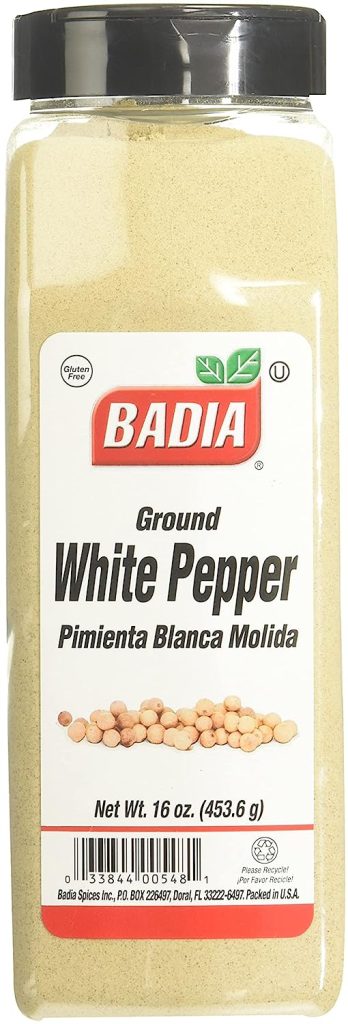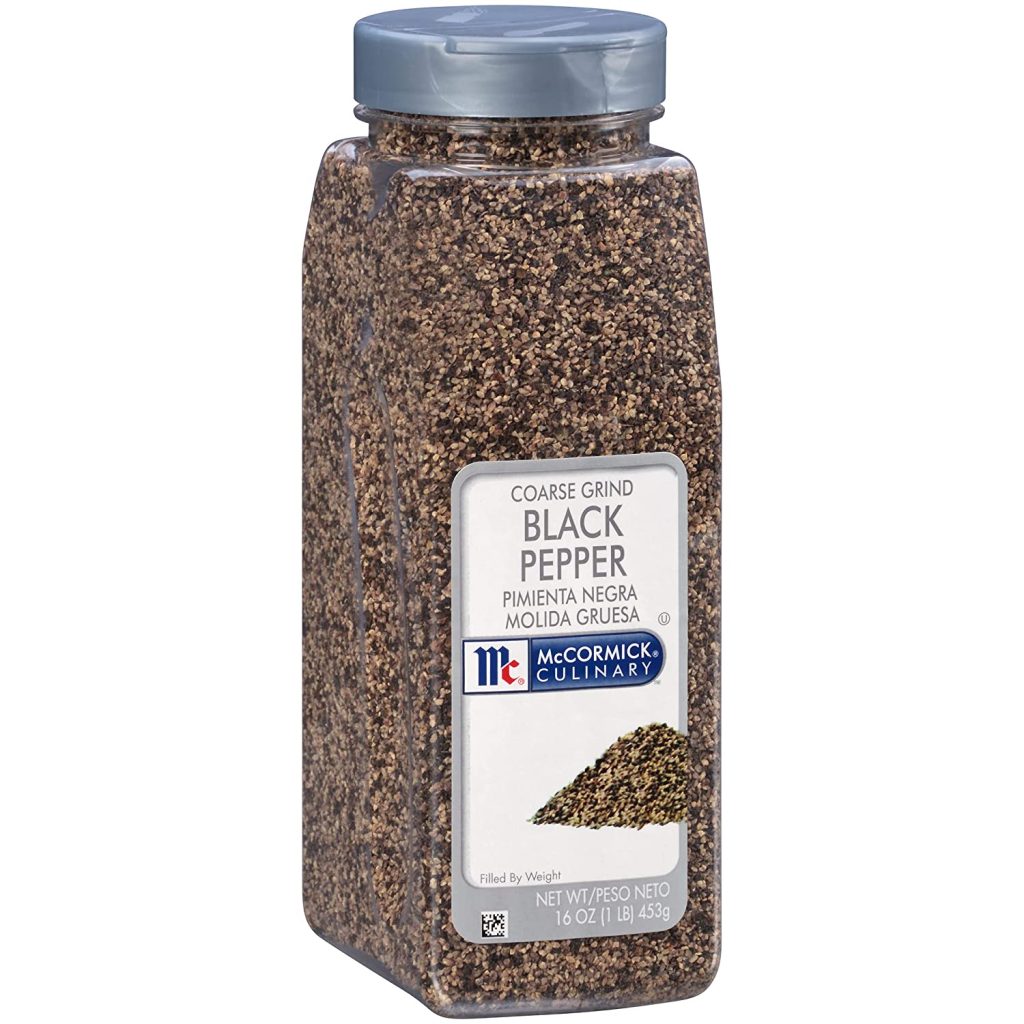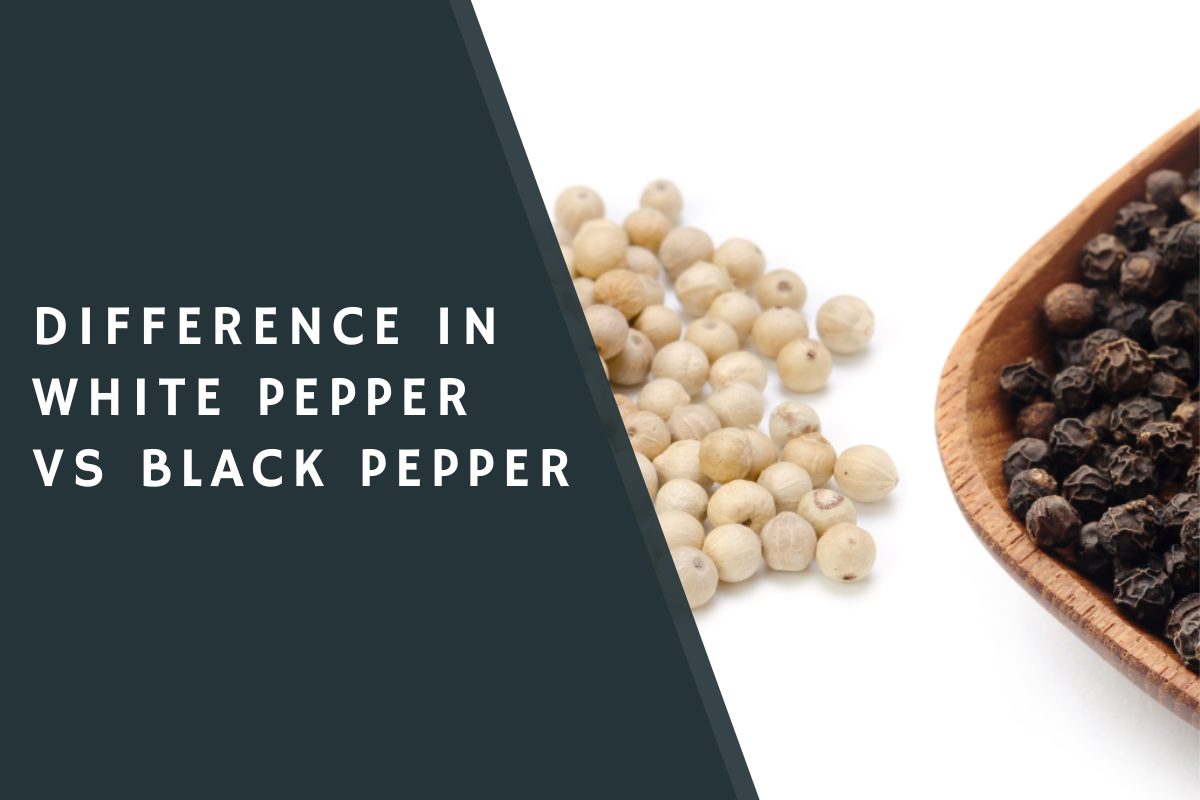When it comes to cooking, black pepper, and white pepper are two of the most common spices in the kitchen.
But, what are the differences between these two varieties? You may be surprised to learn that, despite their similarities, white pepper, and black pepper can have drastically different effects on a dish.
Difference in White Pepper Vs Black Pepper
White pepper is the result of removing the outer layer of the pepper seed, while black pepper is made from the whole unripe berries of the pepper plant. White pepper has a milder and more subtle flavor than black pepper and is commonly used in light-colored dishes. Black pepper is more pungent and has a stronger flavor that can overpower dishes.
In this article, we will explore the differences between white pepper and black pepper, including their taste, appearance, and the best ways to use them in cooking.

See Also: How to Use Black Pepper Essential Oil?
The difference in White Pepper Vs Black Pepper – Details
White pepper and black pepper both come from the same plant, the Piper nigrum. Here are some differences in white pepper vs black pepper:
1: Flavor
One of the most noticeable differences between white pepper and black pepper is their flavor. Black pepper has a bold, pungent flavor that is often described as spicy and slightly bitter.
It is commonly used to add flavor and heat to dishes and is particularly popular in savory dishes such as soups, sauces, and marinades. Black pepper is also used to season meats, vegetables, and grains.
On the other hand, white pepper has a milder, more subtle flavor. It is often described as slightly sweet and slightly pungent, with a slightly earthy undertone.
White pepper is less commonly used as a standalone seasoning but is often used in conjunction with other spices to add depth and complexity to dishes.
It is commonly used in light-colored dishes, such as white sauces and soups, where black pepper would be too visible.

2: Appearance
Another key difference between white pepper and black pepper is their appearance. Black pepper is made from the dried, unripened fruit of the Piper nigrum plant.
It is dark brown in color and has a rough, wrinkled texture. Black pepper is often ground into a fine powder, but can also be purchased in whole peppercorn form.
White pepper, on the other hand, is made from the ripened fruit of the Piper nigrum plant. After the fruit has ripened, it is soaked in water to remove the outer skin and dried.
This process removes the dark outer layer of the pepper, resulting in a pale, ivory-colored pepper. White pepper is usually ground into a fine powder, but can also be purchased in whole peppercorn form.

3: Nutritional value
Black pepper and white pepper have similar nutritional values, as they are both made from the same plant.
Both types of pepper are rich in antioxidants, particularly a compound called piperine, which has been shown to have a number of potential health benefits. Pepper is also a good source of manganese, iron, and dietary fiber.
However, black pepper tends to have a slightly higher concentration of nutrients, as it is made from the unripened fruit of the Piper nigrum plant.
The outer layer of the fruit contains many of the plant’s nutrients, which are removed during the processing of white pepper.
4: Culinary uses
As mentioned earlier, black pepper and white pepper have different flavor profiles and are used in different types of dishes.
Black pepper is commonly used to add heat and flavor to savory dishes, while white pepper is used to add a subtle, earthy flavor to light-colored dishes.
Black pepper is typically used in larger quantities than white pepper, as it has a bolder flavor. It is often used as a standalone seasoning or in combination with other spices.
Black pepper is particularly popular in dishes such as soups, sauces, and marinades, as well as in seasoning meats, vegetables, and grains.
White pepper, on the other hand, is used in smaller quantities due to its milder flavor. It is often used in combination with other spices to add depth and complexity to dishes.
White pepper is commonly used in light-colored dishes such as white sauces, soups, and dressings, where black pepper would be too visible.
It is also often used in dishes where a more subtle flavor is desired, such as in some dessert recipes.
5: Health benefits
Both black pepper and white pepper have a number of potential health benefits due to their high concentration of antioxidants, particularly piperine. Some of the potential health benefits of black pepper and white pepper include:
- Improved digestion: Pepper has been shown to stimulate the production of hydrochloric acid in the stomach, which can help to improve digestion. It may also help to reduce bloating and gas.
- Improved circulation: The warming and stimulating properties of pepper may help to improve circulation, making it useful for conditions such as cold hands and feet.
- Pain relief: Pepper has been used traditionally to help relieve muscle and joint pain. Its warming and stimulating properties may help to soothe sore muscles and ease tension.
- Improved skin health: Pepper has been used topically to improve the appearance of cellulite and to help reduce the appearance of scars. Its warming and stimulating properties may help to break down fatty deposits and improve circulation, which can help to reduce the appearance of cellulite.
Conclusion
No matter which type of pepper you choose to add to your favorite dish, you can be sure that it will add a subtle flavor and a pleasant aroma.
Whether you prefer the bold flavor of black pepper or the earthy taste of white pepper, you can be sure that each type of pepper will add a unique flavor and aroma to your meal.
With a wide variety of types and flavors of pepper to choose from, you can experiment to find the perfect type of pepper for your favorite dishes.
The difference between white pepper and black pepper is clear, and there is no wrong choice when it comes to adding flavor and aroma to your dishes.
Read Also: Where Does Black Pepper Come From?

